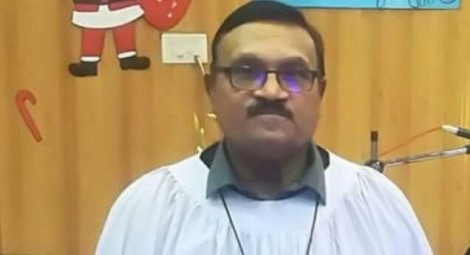
ELLIS HEASLEY, of UK-based religious freedom advocacy CSW, says the recent killing of a pastor in Pakistan was a “painful reminder” of the religiously motivated extremist violence which has plagued Peshawar…
On 30th January Pastor William Siraj, a retired schoolteacher and priest at a church in the Chamkani area of Peshawar, northern Pakistan, was travelling back from a church service with his friend and colleague Rev Patrick Naeem. Sadly, he never made it home.
Pastor Siraj and Rev Naeem, as well as a third individual who was travelling with them, were attacked in their car by two unidentified assailants who opened fire on their vehicle from a motorcycle. Both men were shot and taken to the Lady Reading Hospital, however Pastor Siraj was pronounced dead on arrival. The third passenger was uninjured.

Pastor William Siraj. PICTURE: Courtesy of CSW
“The killing provided a painful reminder of the religiously motivated extremist violence which has plagued Peshawar in the past, including notably a September, 2013, twin suicide bombing attack which killed an estimated 127 people and injured some 250 who had gathered to attend Sunday Mass at All Saints Church.”
No-one has claimed responsibility for the shooting, however in a statement following the attack the Peshawar police chief Abbas Ahsan linked the incident to terrorist elements. He reported that the investigation was being carried out by officials from the Counter Terrorism Department as well as local police.
The killing provided a painful reminder of the religiously motivated extremist violence which has plagued Peshawar in the past, including notably a September, 2013, twin suicide bombing attack which killed an estimated 127 people and injured some 250 who had gathered to attend Sunday Mass at All Saints Church.
Despite drawing condemnation from Pakistan’s then Prime Minister Nawaz Sharif, and a landmark Supreme Court judgement instructing the government to protect minorities which followed soon after, religious minorities across the country have continued to face widespread intolerance, discrimination, and in the most extreme cases such as that Pastor Siraj, violent extremism.
Violence often arises in particular in relation to allegations of blasphemy, an act which is criminalised under Section 295 of the Pakistani Penal Code. The laws are vaguely defined and therefore open to misuse, and often used as a weapon of revenge against both Muslims and non-Muslims to settle personal scores or to resolve disputes over money, property or business.
For example, in December, 2021, Priyantha Diyawadana, a Buddhist and Sri Lankan national, was killed by a mob of hundreds in Punjab after he was accused of desecrating posters bearing the name of the Prophet Mohammed. It later emerged that Mr Diyawadana had been falsely accused by his colleagues at the factory where he worked.
Of course, a large part of what has allowed such rampant intolerance to spread relates to the failure of the Pakistani government, including of Prime Minister Imran Khan himself, to condemn acts of religious extremism such as that which took Pastor Siraj’s life.
In addition, Prime Minister Khan has also repeatedly cosied up to the country’s more conservative Islamic elements, as he did at a meeting with Islamic scholars in Karachi last year during which he stressed that no new law would be enacted under his rule if it was deemed to be “in direct conflict with the teachings of Islam.”
Moves such as these embolden Islamic extremists, and offer little hope to minority communities in Pakistan who continue to suffer under a raft of discriminatory policies, including in education and employment.
We rely on our readers to fund Sight's work - become a financial supporter today!
For more information, head to our Subscriber's page.
One community who find themselves particularly vulnerable are the Ahmadiyya Muslims, for whom the propagation and practice of their own beliefs has been punishable by law since 1974, and who find themselves regularly subjected to intolerance and violence at the encouragement of radical Islamists who deem them ‘non-Muslims.’
The killing of Pastor Siraj should serve as a wake-up call for Pakistan, but so too should the murder of Priyantha Diyawadana, and indeed the many similar instances in which lives have been claimed in the name of religious extremism in recent years. Religious intolerance is rampant in the country, and yet Prime Minister Imran Khan and his government have not only failed to respond, they’ve played a part in creating an atmosphere in which Pakistan is an Islamic nation, where religious minorities are second class citizens, and where Islamic extremists act with impunity.
Today, we must pray that Pakistan reverses this concerning course, claiming this verse from Leviticus 26:6 for the country, and specifically for its religious minority communities: “I will grant peace in the land, and you will lie down and no one will make you afraid.”
Ellis Heasley is public affairs officer at UK-based religious freedom advocacy CSW.





